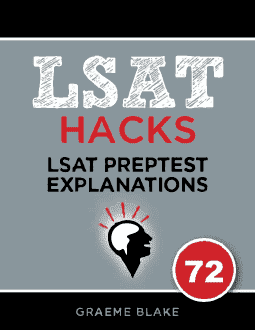QUESTION TEXT: The ancient reptile Thrinaxodon, an ancestor of…
QUESTION TYPE: Role in Argument
CONCLUSION: Thrinaxodon was probably warm blooded.
REASONING: Thrinaxodon may have had whiskers. If it had whiskers, it would have had other hair. The other hair would have provided insulation. This insulation would only be useful for a warm blooded animal.
ANALYSIS: The question is asking about the second sentence. This is a premise. Don’t be fooled by the word “clearly”. This can indicate a conclusion, but here it’s just part of a conditional statement:
Whiskers ➞ Other hair
In fact, you can make a longer chain:
Whiskers ➞ Other hair ➞ Insulation ➞ Insulation not useful for cold blooded
We think Thrinaxodon probably had whiskers. Hence it probably was warm blooded. The second sentence is a premise that supports this conclusion.
___________
- This answer is part right, but misstates the conclusion. The conclusion is after “therefore” – the Thrinaxodon was probably warm blooded.
- CORRECT. The conclusion is after “therefore”. Everything else in the argument is a premise that supports the conclusion.
- The line in question is just a premise. It’s true the sentence said “clearly”. But that doesn’t always indicate a conclusion. In this case it’s just part of a conditional statement. It’s like saying “clearly, all cats have tails”. “Cat” is a sufficient condition.
- Right after this sentence, the argument says “therefore”. That means the argument agrees with the sentence in question, and uses it as evidence for the conclusion.
- There is no phenomenon in the conclusion. A “phenomenon” is a fact. The author claims that Thrinaxodon was probably warm blooded. That is a hypothesis, not a fact. Also the sentence in question definitely supports the hypothesis in the conclusion.


Graeme,
Your explanations are awesome–thank you so much!
Still thinking about C.
The sentence can be parsed either way, as a premise (“all cats have hair”) or as a subsidiary conclusion (“since [I accept your suggestion] this is a cat, this cat has hair”).
If in this case it were a conclusion, since we are dealing with the world of “probably,” it should have said “it likely also had hair.” Since the actual statement is too strong to be logical, it must function as a premise
This assumes the speaker has the same attitude toward language as the testmaker (and I thought they allowed common sense which includes common linguistic usage)
C still throws me off.. isn’t the 2nd part of the sentence (“it clearly also had hair”) a conclusion formed on the basis of the premise (“if it had whiskers”), which itself serves as a premise for the final conclusion? What makes the sentence a premise vs conclusion?
Your analogy on C doesn’t quite fit–it’s not like saying “all cats have tails,” it’s like saying
“this is a cat”
“if it’s a cat, it has a tail.” [not “all cats have tails”]
the 2nd half is a conclusion about a specific entity, not a general principle
I wonder if I am reading “if” colloquially, and they are reading it formally (but then again, they say you can use common sense)
Help!
Functionally, “all cats have tails” is the same as saying “if it’s a cat, it has a tail”.
The second sentence is essentially saying “It has whiskers, and all animals with whiskers also have other hair which serves to insulate”. It’s phrased more like a conclusion in order to trick you!
Hi Graeme,
I wondered if you could comment on the use of the term “main conclusion” in answer choice B. When I did the practise test, this threw me off a little, since I couldn’t see intermediate conclusions leading up to the “therefore,” statement. Is the segment of the sentence that reads, “suggesting that it had sensory whiskers” an intermediate conclusion? I was fooled and selected choice A.
Best,
The answer would have been equally correct if it just said “conclusion”. I’ve literally never seen an LSAT question precisely test any technical sense of intermediate conclusion vs. main conclusion.
Generally it’s damn obvious that something isn’t the main conclusion. In some cases I wouldn’t have even called that thing an “intermediate conclusion”. I would have just said “premise”. But the answer describing that sentence says “intermediate conclusion”. So I think “fine, whatever, intermediate conclusion” and pick it. But my thoughts on intermediate conclusions are no more elaborate than that. This is a topic that truly doesn’t matter, despite LSAC hinting that it’s important.